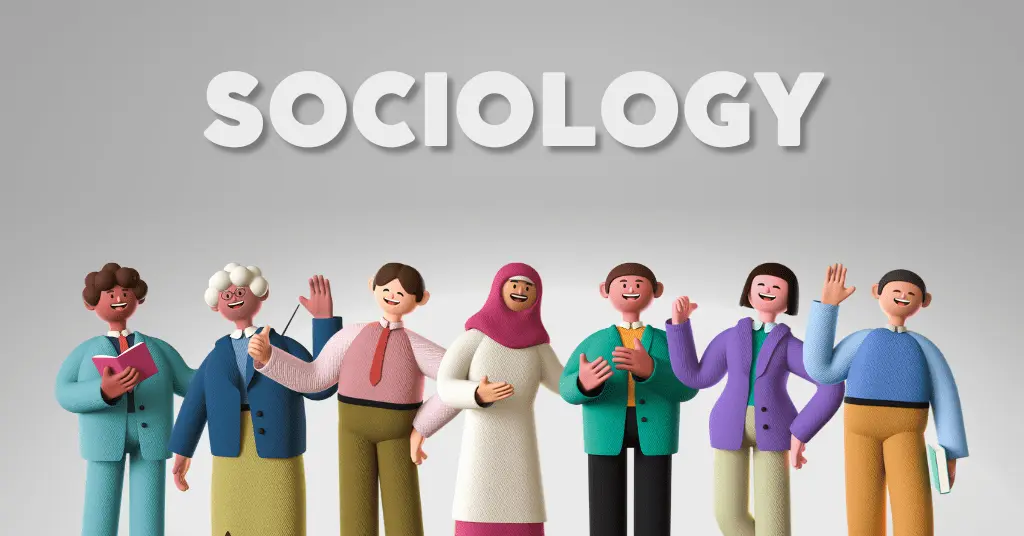Exploring the Dynamics of Society: An Introduction to Sociology
Sociology, the study of human society and social behavior, offers valuable insights into the complexities of social interactions, institutions, and structures. From analyzing patterns of behavior to understanding the impact of social forces on individuals and communities, sociology provides a comprehensive framework for examining the world around us and addressing pressing social issues. In this article, we delve into the field of sociology, exploring its key concepts, methods, and contributions to our understanding of society.
Understanding Society through Sociology
At its core, sociology seeks to understand the social forces that shape human behavior, relationships, and institutions. It examines how individuals are influenced by their social environment, cultural norms, and social structures, as well as how they, in turn, shape society through their actions and interactions. By studying patterns of behavior, social institutions, and inequalities, sociologists aim to uncover the underlying dynamics of society and propose solutions to social problems.
Key Concepts in Sociology
- Social Structure: Social structure refers to the patterned social arrangements and relationships that shape society, including institutions such as family, education, economy, and government. Sociologists analyze how social structures influence individual behavior and societal outcomes.
- Culture: Culture encompasses the beliefs, values, norms, and practices shared by members of a society. Sociologists study cultural patterns and processes, including cultural diversity, socialization, and cultural change, to understand how culture shapes social life.
- Socialization: Socialization is the process through which individuals learn and internalize the norms, values, and behaviors of their society. Sociologists examine how socialization occurs within families, schools, peer groups, and other social institutions, shaping individuals’ identities and roles in society.
- Social Interaction: Social interaction refers to the ways in which individuals engage with one another in social settings. Sociologists study patterns of social interaction, including cooperation, conflict, and symbolic communication, to understand the dynamics of social relationships and group behavior.
- Social Inequality: Social inequality refers to disparities in wealth, power, and opportunities that exist within society. Sociologists analyze the causes and consequences of social inequality, including poverty, discrimination, and social stratification, and advocate for social justice and equality.
Methods of Sociological Inquiry
Sociologists employ various research methods to study society and social behavior, including:
- Surveys: Surveys involve collecting data from a sample of individuals through questionnaires or interviews to gather information about their attitudes, beliefs, and behaviors.
- Observation: Observation involves systematically watching and recording social behavior in natural settings to understand social interactions and patterns.
- Experiments: Experiments involve manipulating variables in controlled settings to test hypotheses and identify cause-and-effect relationships.
- Qualitative Research: Qualitative research involves gathering in-depth insights and understanding of social phenomena through methods such as interviews, focus groups, and textual analysis.
- Quantitative Research: Quantitative research involves analyzing numerical data and statistical patterns to identify trends and patterns in social behavior.
Contributions of Sociology
Sociology has made significant contributions to our understanding of society and has influenced various fields, including public policy, education, healthcare, and criminal justice. Some key contributions of sociology include:
- Social Change: Sociology examines the causes and consequences of social change, including social movements, globalization, and technological advancements, and explores ways to promote positive social change and progress.
- Social Policy: Sociological research informs the development of social policies and interventions aimed at addressing social problems, reducing inequalities, and improving the well-being of individuals and communities.
- Critical Analysis: Sociology provides a critical lens for examining social issues and challenging taken-for-granted assumptions about society, including issues of power, privilege, and social justice.
- Global Perspective: Sociology adopts a global perspective, exploring the interconnectedness of societies and cultures and addressing global challenges such as poverty, migration, and environmental degradation.
Exploring the Pathways to Understanding Human Society
Choosing a career in sociology offers individuals the opportunity to delve into the intricacies of human society, unravel social complexities, and contribute to positive social change. With its focus on understanding social behavior, institutions, and structures, sociology provides a rich and rewarding career path for those passionate about exploring the dynamics of human interaction and addressing pressing social issues. In this article, we delve into the reasons why individuals choose sociology as a career and the diverse opportunities it offers for professional growth and impact.
Understanding Society and Human Behavior
At the heart of sociology lies a profound curiosity about human society and the factors that shape individual and collective behavior. For many individuals, choosing sociology as a career is driven by a desire to gain deeper insights into social phenomena, understand the root causes of social problems, and contribute to building more equitable and inclusive societies.
Advancing Social Justice and Equity
Sociology empowers individuals to advocate for social justice, equity, and equality. By examining patterns of inequality, discrimination, and social exclusion, sociologists play a crucial role in identifying systemic barriers and advocating for policy reforms and social interventions to address these injustices. For those committed to making a positive difference in the world, a career in sociology provides a platform to effect meaningful change and promote social justice for marginalized communities.
Conducting Research and Analysis
Sociology offers diverse opportunities for research and analysis across a wide range of topics, including race and ethnicity, gender and sexuality, education, healthcare, crime and deviance, and globalization. Sociologists employ a variety of research methods, including surveys, interviews, observations, and statistical analysis, to generate new knowledge, challenge existing paradigms, and inform evidence-based policies and interventions. For individuals with a passion for inquiry and discovery, a career in sociology provides endless opportunities to explore complex social phenomena and contribute to the advancement of knowledge.
Engaging with Communities and Organizations
Sociologists often work closely with communities, organizations, and policymakers to address social issues and implement positive change. Whether conducting community-based research, designing intervention programs, or providing expert consultation to government agencies and nonprofit organizations, sociologists play a vital role in bridging the gap between research and practice. For individuals interested in community engagement, advocacy, and applied sociology, a career in sociology offers opportunities to make a tangible impact at the grassroots level and effect transformative change in people’s lives.
Pursuing Diverse Career Paths
One of the greatest strengths of sociology as a career is its versatility and adaptability to a wide range of professional fields. Sociologists find employment in academia, government agencies, nonprofit organizations, research institutes, think tanks, healthcare organizations, social service agencies, and corporate settings. Whether teaching, conducting research, developing policy, or working directly with communities, sociologists bring valuable insights and analytical skills to a variety of roles and industries. For individuals seeking a career that combines intellectual rigor with real-world impact, sociology offers a diverse and fulfilling pathway to professional success.
Exploring the Multifaceted Disciplines within Sociology: A Comprehensive Overview
Sociology, as a multifaceted discipline, encompasses a wide range of subjects that illuminate the complexities of human society and social interactions. From the study of social institutions and cultural norms to the analysis of inequality and social change, sociology offers diverse avenues for exploration and understanding. In this article, we delve into the various subjects that comprise the field of sociology, highlighting the key areas of inquiry and their significance in advancing our knowledge of society.
Sociological Subjects: A Broad Spectrum of Inquiry
- Social Institutions: Social institutions, such as family, education, economy, politics, and religion, are fundamental to the structure and functioning of society. Sociology examines how these institutions shape social behavior, maintain social order, and perpetuate social norms and values.
- Culture and Cultural Sociology: Culture encompasses the beliefs, values, norms, and practices shared by members of a society. Cultural sociology explores how culture shapes individual and collective identity, socialization processes, and patterns of behavior, as well as how culture evolves and changes over time.
- Social Stratification and Inequality: Social stratification refers to the hierarchical arrangement of individuals and groups within society based on factors such as wealth, power, and social status. Sociology analyzes the causes and consequences of social inequality, including poverty, discrimination, and social mobility, and explores strategies for reducing inequality and promoting social justice.
- Social Change and Social Movements: Social change refers to the transformation of social structures, institutions, and values over time. Sociology examines the drivers of social change, including technological advancements, globalization, and social movements, and studies their impact on individuals, communities, and societies.
- Gender and Sexuality: Gender and sexuality are central aspects of social identity and social relations. Sociology explores the social construction of gender and sexuality, the intersections of gender with other forms of inequality, and the dynamics of power and oppression in gendered relationships and institutions.
- Race and Ethnicity: Race and ethnicity are significant factors in shaping social identity, inequality, and relations within society. Sociology examines the social construction of race and ethnicity, patterns of racial and ethnic inequality, and the impact of racism and discrimination on individuals and communities.
- Crime and Deviance: Crime and deviance encompass behaviors that violate social norms and laws. Sociology explores the social construction of crime and deviance, the factors that contribute to criminal behavior, and the role of social institutions such as the criminal justice system in responding to deviant behavior.
- Health and Medicine: Sociology examines the social determinants of health, including socioeconomic status, race, gender, and access to healthcare. It explores how social factors influence health outcomes, healthcare disparities, and the organization and delivery of healthcare services.
Interdisciplinary Connections
Sociology intersects with various other disciplines, including psychology, economics, political science, anthropology, and geography, enriching our understanding of society through interdisciplinary perspectives. By integrating insights from multiple disciplines, sociology offers a holistic approach to studying social phenomena and addressing complex social issues.
A Guide to Pursuing Excellence in Social Science Education
Choosing the right university for studying sociology is essential for aspiring sociologists seeking to receive high-quality education, access esteemed faculty, and engage in cutting-edge research. Sociology programs at top universities offer rigorous coursework, diverse research opportunities, and a vibrant academic community dedicated to advancing knowledge in the field. In this article, we explore some of the top universities renowned for their excellence in sociology education and research.
Harvard University
Harvard University, located in Cambridge, Massachusetts, is consistently ranked among the top universities for sociology worldwide. The Department of Sociology at Harvard offers a comprehensive program that emphasizes both theoretical foundations and empirical research methods. With esteemed faculty members known for their groundbreaking research in areas such as social stratification, political sociology, and social movements, Harvard provides an intellectually stimulating environment for students interested in sociology.
Stanford University
Stanford University, situated in California’s Silicon Valley, boasts a renowned sociology department known for its innovative research and interdisciplinary approach. The Department of Sociology at Stanford offers a diverse range of courses and research opportunities, covering topics such as social psychology, organizational sociology, and globalization. With access to state-of-the-art facilities and a collaborative academic community, Stanford provides an ideal environment for students to explore the complexities of social life.
University of California, Berkeley
The University of California, Berkeley, is home to one of the top sociology departments in the United States. The Department of Sociology at Berkeley offers a rigorous curriculum that emphasizes both quantitative and qualitative research methods, preparing students for careers in academia, research, and public policy. With a focus on critical thinking, social justice, and global perspectives, Berkeley’s sociology program equips students with the knowledge and skills to address pressing social issues.
University of Chicago
The University of Chicago’s Department of Sociology is renowned for its intellectual rigor, theoretical depth, and interdisciplinary approach. The sociology program at UChicago emphasizes the integration of theory and empirical research, with faculty members conducting cutting-edge research in areas such as urban sociology, race and ethnicity, and social theory. With a strong commitment to academic excellence and innovation, UChicago provides students with a supportive environment to pursue their scholarly interests in sociology.
University of Cambridge
The University of Cambridge, located in the United Kingdom, is internationally recognized for its excellence in sociology education and research. The Department of Sociology at Cambridge offers a dynamic and interdisciplinary program that covers a wide range of topics, including social inequality, culture and identity, and globalization. With access to world-class faculty members and research facilities, Cambridge provides students with a stimulating intellectual environment to explore the complexities of contemporary society.
University of Oxford
The University of Oxford, located in the United Kingdom, is renowned for its world-class sociology department. The Sociology Faculty at Oxford offers a rigorous curriculum that covers a wide range of topics, including social theory, research methods, and social policy. With access to renowned faculty members and research centers, Oxford provides students with an intellectually stimulating environment to engage in cutting-edge sociological research.
University of California, Los Angeles (UCLA)
UCLA’s Department of Sociology is recognized for its excellence in sociological research and teaching. The sociology program at UCLA emphasizes interdisciplinary approaches to studying social phenomena, with faculty members conducting research in areas such as immigration, race and ethnicity, and social movements. With its diverse student body and vibrant academic community, UCLA offers students ample opportunities for intellectual growth and research collaboration.
London School of Economics and Political Science (LSE)
The London School of Economics and Political Science (LSE) is internationally renowned for its rigorous sociology programs and groundbreaking research. The Department of Sociology at LSE offers a wide range of courses and research opportunities, covering topics such as social theory, globalization, and digital sociology. With its central location in London and access to a diverse range of resources, LSE provides students with a vibrant and cosmopolitan academic environment.
University of Michigan, Ann Arbor
The University of Michigan’s Department of Sociology is known for its interdisciplinary approach to sociological research and teaching. The sociology program at Michigan emphasizes empirical research methods and critical analysis, with faculty members conducting research in areas such as social networks, urban sociology, and environmental sociology. With its strong emphasis on research and innovation, Michigan provides students with valuable opportunities for academic and professional development.
University of Toronto
The University of Toronto’s Department of Sociology is recognized for its excellence in sociological scholarship and teaching. The sociology program at Toronto offers a diverse range of courses and research opportunities, covering topics such as migration, gender and sexuality, and social inequality. With its multicultural and cosmopolitan campus environment, Toronto provides students with a rich and dynamic academic experience that prepares them for careers in academia, research, and public policy.




